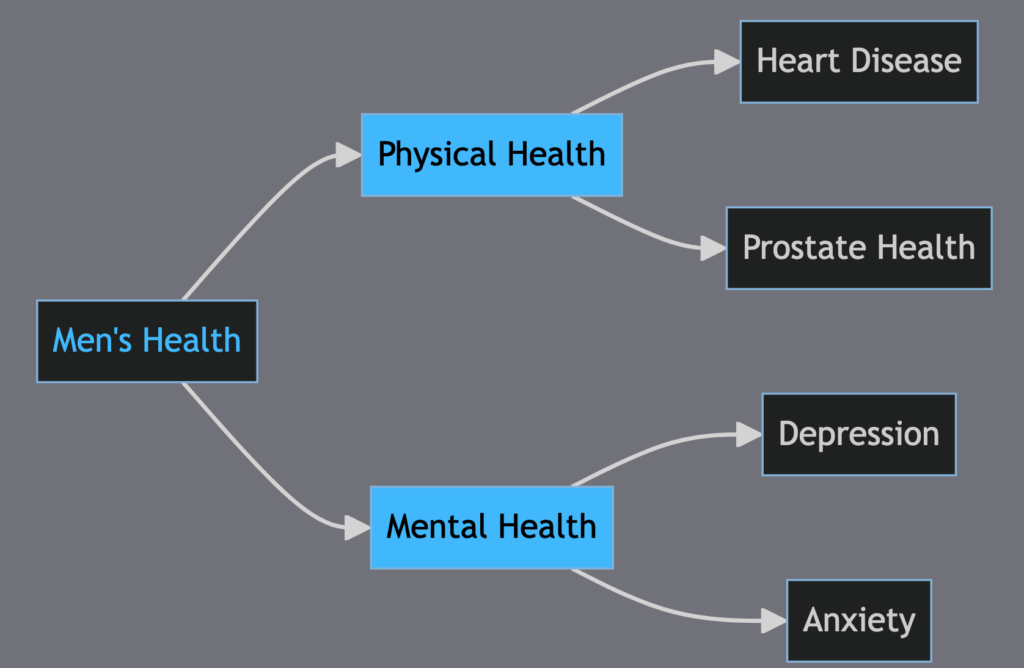Physical Address
304 North Cardinal St.
Dorchester Center, MA 02124
Physical Address
304 North Cardinal St.
Dorchester Center, MA 02124

Men’s health is a multifaceted concept encompassing physical, mental, and emotional well-being. It goes beyond the absence of disease and involves maintaining a high quality of life. Despite tremendous advancements in medical science and healthcare accessibility, many men still neglect their health, often prioritizing work, family, or societal expectations over self-care. This neglect is influenced by cultural stigmas, a lack of education about health issues, and the misconception that seeking help signifies weakness. Addressing these barriers is crucial to improving health outcomes and ensuring men live longer, healthier, and more fulfilling lives.
Globally, men experience higher rates of chronic illnesses and lower life expectancy compared to women. According to the World Health Organization (WHO), men are more likely to die from preventable causes such as cardiovascular disease, respiratory illnesses, and accidents. Additionally, men are disproportionately affected by mental health issues like depression and suicide, yet they are less likely to seek treatment. The reasons for these disparities include biological differences, risk-taking behaviors, and societal expectations to “tough it out” rather than seek help.
By understanding these challenges, we can tailor health initiatives and encourage men to prioritize their well-being. Preventive care, education, and open dialogue are critical tools for closing the health gap between men and women.
Several factors contribute to men’s tendency to neglect their health:
Understanding the primary health concerns affecting men is the first step in promoting proactive healthcare. Below are some of the most pressing issues:

For those looking for more information on men’s health, there are numerous resources available that provide valuable insights into various aspects of this important topic.
Cardiovascular disease, including heart attacks, strokes, and coronary artery disease, is a leading cause of mortality among men. Factors like high cholesterol, hypertension, smoking, obesity, and lack of exercise contribute to its prevalence. Men often dismiss early warning signs such as chest discomfort or shortness of breath. Prevention starts with lifestyle modifications: adopting a heart-healthy diet low in saturated fats and high in fiber, engaging in regular physical activity, quitting smoking, and managing stress effectively. Regular health checkups are vital to monitor blood pressure, cholesterol, and glucose levels. Medications may be prescribed to manage risk factors, significantly reducing complications.
Preventive Measures:
Prostate health becomes increasingly critical as men age, with conditions like benign prostatic hyperplasia (BPH), prostatitis, and prostate cancer being common concerns. Prostate cancer, the second most common cancer in men, often presents no symptoms in its early stages, making regular screenings essential. Risk factors include age, family history, and ethnicity, with African-American men being more susceptible. To promote prostate health, include foods rich in lycopene (tomatoes) and antioxidants (green tea) in your diet. Staying physically active and maintaining a healthy weight are also crucial. Discuss screening options such as prostate-specific antigen (PSA) tests with your healthcare provider for early detection.
Tips for Prostate Health:
Mental health challenges, including depression, anxiety, and substance use disorders, are widespread but frequently underreported in men. Cultural stigmas around masculinity often prevent men from seeking help, leading to worsening symptoms or self-medication. Depression in men may manifest differently, with symptoms like anger, irritability, or risk-taking behavior rather than sadness. Suicide rates are disproportionately higher in men, highlighting the urgency of addressing mental health. Encouraging open discussions, seeking therapy, and fostering supportive relationships are crucial steps. Workplace programs and online resources can also provide accessible help. Breaking the stigma around mental health empowers men to take control of their well-being.
Managing Mental Health:
Lung cancer is a leading cause of cancer-related deaths in men, with smoking being the primary risk factor. However, non-smokers are not exempt, as exposure to radon, air pollution, and secondhand smoke can also contribute. Symptoms like persistent cough, chest pain, and shortness of breath often appear in advanced stages, making early detection critical. Preventive strategies include quitting smoking, avoiding known carcinogens, and maintaining a healthy diet rich in antioxidants. Regular screenings with low-dose CT scans are recommended for those at higher risk, such as heavy smokers. Early diagnosis significantly improves treatment outcomes and long-term survival rates.
Steps to Prevent Lung Cancer:
Type 2 diabetes is a growing epidemic among men, driven by poor dietary habits, sedentary lifestyles, and obesity. Uncontrolled diabetes can lead to severe complications, including heart disease, kidney failure, nerve damage, and vision problems. Symptoms such as excessive thirst, frequent urination, and unexplained fatigue often go unnoticed until the condition worsens. Preventing diabetes involves adopting a balanced diet with whole grains, lean proteins, and minimal sugar intake. Regular physical activity helps regulate blood sugar levels and maintain a healthy weight. Routine screenings are essential for early detection, especially for men with a family history of diabetes or obesity.
Prevention and Management:
Sexual health issues, including erectile dysfunction (ED), low libido, and infertility, significantly impact a man’s quality of life. While these problems are common, they are often stigmatized, leading many men to suffer in silence. Causes range from stress and anxiety to underlying conditions like diabetes, hypertension, and hormonal imbalances. Addressing these issues begins with open communication with a healthcare provider. Treatment options for ED include lifestyle changes, medications, or devices like vacuum pumps. Hormonal therapies can correct low testosterone levels. A healthy lifestyle, including regular exercise, a balanced diet, and stress management, also plays a crucial role in improving sexual health.
Solutions for Sexual Health:
Obesity is a major public health concern, linked to diabetes, heart disease, and various cancers. Men with higher body fat percentages often experience reduced testosterone levels, affecting energy and mood. Managing obesity involves more than just dieting; it requires a sustainable lifestyle change. Adopting a nutrient-rich diet with controlled portions, avoiding sugary drinks, and prioritizing home-cooked meals are effective steps. Regular physical activity, combining cardio and strength training, is essential for weight loss and muscle maintenance. Setting achievable goals and tracking progress keeps motivation high. Professional guidance from dietitians or fitness coaches can help tailor personalized weight loss plans.
Weight Loss Tips:
Skin cancer, including melanoma, is a preventable yet often overlooked health risk in men. Prolonged exposure to ultraviolet (UV) rays from the sun or tanning beds is the primary cause. Men are more likely to skip sunscreen or protective measures, increasing their risk. Early signs of skin cancer include new moles, changes in existing moles, or sores that do not heal. Prevention involves wearing sunscreen daily with an SPF of 30 or higher, using protective clothing, and avoiding peak sunlight hours. Regular self-examinations for unusual skin changes and annual dermatologist visits can ensure early detection and successful treatment.
Skin Cancer Prevention Tips:
Osteoporosis, often considered a condition affecting women, is also a significant concern for men, especially as they age. This condition results in reduced bone density, increasing the risk of fractures, particularly in the hips, spine, and wrists. Men are less likely to be diagnosed with osteoporosis because it is frequently overlooked during routine checkups. Risk factors include low testosterone levels, prolonged use of certain medications (such as corticosteroids), smoking, excessive alcohol consumption, and inadequate intake of calcium and vitamin D.
Excessive alcohol consumption and substance abuse remain critical public health issues for men. Prolonged misuse can lead to liver damage, cardiovascular diseases, mental health disorders, and social consequences like strained relationships and job loss. Men are more likely than women to engage in binge drinking and illicit drug use, putting them at higher risk of addiction and its associated complications.
Hypertension, or high blood pressure, is a common yet serious condition that can silently damage the heart, kidneys, and blood vessels over time. Often called the “silent killer” due to its lack of symptoms, hypertension significantly increases the risk of heart attacks, strokes, and kidney failure. Genetics, poor diet, obesity, and stress are key contributors to the condition.
Sleep disorders such as sleep apnea, insomnia, and restless leg syndrome affect millions of men. These conditions disrupt the restorative process of sleep, leading to fatigue, poor concentration, and increased risk of chronic illnesses like hypertension and diabetes. Sleep apnea, characterized by pauses in breathing, is particularly common and linked to obesity.
Gastrointestinal conditions like GERD (gastroesophageal reflux disease) and IBS (irritable bowel syndrome) are common among men, often due to dietary habits, stress, or genetic predisposition. Symptoms such as heartburn, bloating, and irregular bowel movements can significantly impact quality of life if left unmanaged.
Infectious diseases, including hepatitis, HPV, and influenza, can have long-lasting health effects if not prevented or treated promptly. Vaccinations play a pivotal role in safeguarding against these illnesses, while practicing good hygiene and safe behaviors minimizes transmission risks.
Chronic pain, whether due to arthritis, back pain, or other conditions, can severely limit daily activities and affect mental health. Pain often leads to reduced mobility, increased dependence on medications, and a lower quality of life if not managed effectively.
Physical activity is crucial for maintaining cardiovascular health, mental well-being, and joint mobility. Sedentary lifestyles increase the risk of obesity, diabetes, and reduced functional capacity, especially as men age.
Chronic stress from work and personal responsibilities contributes to a wide array of health issues, including heart disease, depression, and sleep disorders. Achieving work-life balance is essential for long-term well-being.